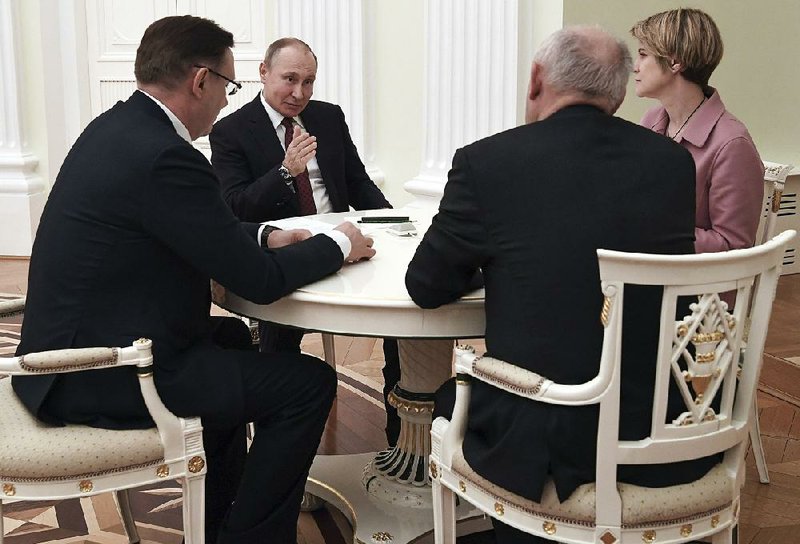MOSCOW -- With his best election showing ever, President Vladimir Putin is shifting into his next six-year term, but the question of what comes next already looms on Russia's horizon.
At his first appearance after Sunday's victory, Putin was immediately asked about his plans beyond 2024, reflecting Russia's nervousness about the succession issue that will dominate the political landscape for the near future.
Putin piled up nearly 77 percent of the vote, burnishing his credentials as a leader who enjoys overwhelming public support. That will give him more room to ponder his choice: groom a reliable successor, scrap term limits or create a new position of power so he can continue pulling the strings after his fourth term ends.
All those options will remain on the table, and Putin has a few more years before he needs to make a choice.
Asked if he could initiate changes to the constitution, he answered with a characteristic reticence, saying he has no such plans "yet."
He also laughed off a suggestion that he could take a six-year break before moving to reclaim the presidency in 2030.
Alexander Baunov, an analyst with the Carnegie Moscow Center, said it would be good for Putin "to leave the presidential post with a record high result," since this is theoretically his final presidential term.
"His final term in this chair ... will be a period of transition of power. It's much easier to enter this transition of power when you have this especially high result," Baunov said.
In the past few years, Putin has methodically reshuffled Cabinet members and provincial governors. Some of them, such as Tula Gov. Alexei Dyumin, 45, and Economics Minister Maxim Oreshkin, 35, have been named among potential successors.
Skeptics note, however, that the Kremlin might deliberately encourage succession rumors to see how the elites and broader public react.
The 65-year-old Russian leader remains in good physical shape, continuing to play ice hockey and engaging in other vigorous outdoor activities, and he could be strong enough to carry on beyond 2024.
Putin observed the two-term limit in 2008, shifting into the prime minister's seat and allowing longtime associate Dmitry Medvedev to serve as president for four years.
After reclaiming the presidency in 2012, Putin focused on reasserting Russia's global clout and acted boldly to defy the West. That policy culminated in Russia's 2014 annexation of Crimea and support for a separatist insurgency in eastern Ukraine -- actions that drew Western sanctions and sparked tensions unseen since Cold War times.
Putin has cast himself as a protector against U.S.-led plots to sideline and weaken Russia. While those showdowns have exacerbated Russia's economic woes, they also raised patriotic feelings and bolstered Putin's support.
Tatyana Orlova, a 67-year-old St. Petersburg pensioner who voted for Putin, praised him as "the defender of our Motherland, who revived the army, brought Crimea back to Russia, raised up Russia from its knees."
While such defiance of the West resonates well with Russians, there has been a plunge in living standards triggered by the combined blow of sanctions and lower oil prices. Many are unhappy with his performance at home and expect him to raise wages, improve ailing education and health care systems and modernize crumbling infrastructure.
"Six years ago, everyone was well-off, people were buying cars, apartments," said Irina Korovina, 34, who voted for Putin in Yekaterinburg.
"Now things are more difficult. People are economizing on food, on clothes. I'd like things to go back to where they were."
Earlier this month, Putin had set a target of a 50 percent increase in Russian GDP per capita by the middle of the next decade, but he offered little detail of how that could be achieved. His state-of-the-nation speech reflected concern about Russia being left behind other countries if it doesn't innovate more.
In the short term, Putin may shake up his government and security structures and test some new names to see if they are worthy successors.
They probably will be young technocrats "who have no political past and no ideological passions," said Paris-based analyst Tatyana Stanovaya.
If he hasn't found a serious candidate by the middle of his term and is facing "fear and nervousness ... then Putin will have a greater temptation to stay in power," she added.
Information for this article was contributed by Nataliya Vasilyeva, James Ellingsworth and Irina Titova of the Associated Press.
A Section on 03/20/2018
